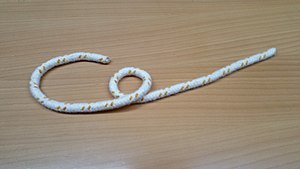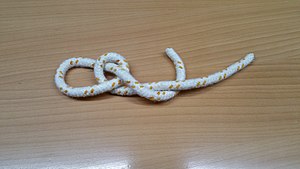Vigyan Ashram has designed & developed a "1000 L Modular Grey Water System" for schools / small houses/ bungalows. Users of the manual will be able to build their own grey water system using this manual. All the Bills of Materials (BOM) and dimensions of the systems are given in the design. We have provided designs files drawn using Solid works along with this manual. Users are suggested to read the manual carefully along and assess the site conditions before fabrication of the unit. Supported by the LA Foundation for this DIY manual.
Purpose of project[edit | edit source]
- To share standardized design of grey water systems suitable for small bungalows, hamlets, schools and institutes.
- To reduce cost of construction of reed bed systems using readily available IBC tanks.
- Design to be made available online for local fabricators to build grey water systems for their customers.
Product Description[edit | edit source]
This is a 1000L modular grey water system. This system can be deployed on plain ground, no excavation needed. Tanks to be arranged at elevation of 2 feet and 1 feet respectively from ground level to get the benefit of gravity for water flow. System consists of a sludge tank, four 500L IBC tanks with reeds bed, two pumps of 0.25 HP for water circulation, piping connections and 1000L IBC for water storage.
The proposed system is able to reduce COD (chemical oxygen demand) of output water to 20-100 mg/L (ppm-Parts Per Million) and DO (Dissolve Oxygen) greater than 2.
- https://www.appropedia.org/File:1000_lit_Gray_water_system_with_name.png
- https://www.appropedia.org/File:Explode_-_Explode.png
- https://www.appropedia.org/File:1000_lit_Gray_water_system_Callouts2.png
- https://www.appropedia.org/File:BOM3-BOM3.png
Features[edit | edit source]
- Capacity: 1000 L/day
- Total area required: (6mtrs*2.4mtrs) = 14.4mtr2 ~ 157sq.feet.
- Recycle water use: o Gardening o Toilet Flushing
How it works? - Grey Water[edit | edit source]
There are two kinds of domestic waste water – black water and grey water. Black water is the one which is released from the toilets whereas grey water is from the bathroom & from the kitchen. The amount of grey water generated depends on the individual's consumption of freshwater. The water used for washing hands, vegetables, and dishes or even for bathing can easily be recycled to bridge the ever increasing demand and supply gap.
How to recycle grey water?[edit | edit source]
- Usually our houses are built in a way that black water and grey water get mixed. To avoid this, separate pipelines are needed to isolate the discharge of both these kinds of waste water.
- While the black water can go into the drain, grey water pipe can be diverted to a small sludge tank where all such water gets collected.
- While water from the bathroom will contain things like hair, oil, and soap sediments, water from the kitchen sink might have small quantities of food items like rice, lentils or other such contents.
- Once grey water is collected separately, the next step is to pass through reed beds for filtration. After the filtration process, grey water is collected in the storage tank and is given excessive bubbling. After this process grey water is fit to be used for gardening or flushing purposes.
- Parts for purchase
Step by Step installation[edit | edit source]
Step 1: IBC (500 L) Preparation
Step 2: Ground & Elevation Preparation
Step 3: Sludge Tank (100 L)
Step 4: IBC 1(500 L)
Step 5: IBC 2(500 L)
Step 6: IBC 3(500 L)
Step 7: IBC 4(500 L)
Step 8: Pump & Stand 1
Step 9: Pump & Stand 2
Step 10: Storage Tank & Air Pump
Bill of materials[edit | edit source]
Description of costs, donations, the fact that this is just proposed, etc. For a simple cost table, see Help:Table examples#Cost Table and Template:Bill of materials for two nice formats.
| Item | Amount | Cost per unit | Total |
|---|---|---|---|
| Inverter — 100W | 1 | INR 4,900.00 | INR 4,900.00 |
| Panel — 20W | 1 | INR 850.00 | INR 850.00 |
| Battery — 12V,7Ah | 1 | INR 1,000.00 | INR 1,000.00 |
| Grand total | INR 6750USD 90.18 <br />EUR 77.56 <br />GBP 65.83 <br />CAD 111.82 <br />MXN 1,880.26 <br /> | ||
Instructions[edit | edit source]
This is a plan to maintain your project. The step by step how to template {{Steps}} is most likely the best way to display a process, which will look like this:
- Please prepare the ground with the levels required to put IBC tanks.
- For levels bricks or cement block like materials are required for preparing level.
- We need to ensure there are no sharp stones in the basement of the IBC tank.
- To mark the outline 6m*2.4m dimension for system are given below,
- Sludge tank contains two compartments. One for settlement of sludge & another for screening water.
- Please use the fittings and pipes to sludge tank.
- IBC pipe fitting can be done as follows:
- https://www.appropedia.org/File:Sludge_Tank(100_L)_1.png
- https://www.appropedia.org/File:Sludge_Tank(100_L)_2.png
- https://www.appropedia.org/File:Sludge_Tank(100_L)_3.png
- https://www.appropedia.org/File:Sludge_Tank(100_L).png
- IBC 1 has two pipes connections, one from the sludge tank on the right side wall and the other on the right upper side, towards IBC 2.
- Please use the fittings and pipes to IBC 1 are as follows:
- https://www.appropedia.org/File:IBC(500_L)_1.4.png
- https://www.appropedia.org/File:IBC(500_L)_1.png
- https://www.appropedia.org/File:IBC(500_L)_1.2.png
- https://www.appropedia.org/File:IBC(500_L)_1.3.png
- IBC 2 having pipes connected right upper side on front wall, towards IBC 3.
- Connect water transferring pipe fitting as shown below.
- https://www.appropedia.org/File:IBC(500_L)_2.3.png
- https://www.appropedia.org/File:IBC(500_L)_2.png
- https://www.appropedia.org/File:IBC(500_L)_2.1.png
- https://www.appropedia.org/File:IBC(500_L)_2.2.png
- IBC 3 having centrally pipe connection at bottom from wall side towards IBC 4.
- Connect water transferring pipe fitting as shown below.
- https://www.appropedia.org/File:IBC(500_L)_3.3.png
- https://www.appropedia.org/File:IBC(500_L)_3.png
- https://www.appropedia.org/File:IBC(500_L)_3.1.png
- https://www.appropedia.org/File:IBC(500_L)_3.2.png
- IBC 4 having two pipe connections.
- One is at bottom back wall side & another at bottom right corner of front wall side.
- Connect water transferring pipe fitting as shown below:
- https://www.appropedia.org/File:IBC(500_L)_4.3.png
- https://www.appropedia.org/File:IBC(500_L)_4.png
- https://www.appropedia.org/File:IBC(500_L)_4.1.png
- https://www.appropedia.org/File:IBC(500_L)_4.2.png
- Pump and stand 1 transfer water from IBC 4 to the Storage tank.
- At inlet of pump having PVC piping & outlet Flexible pipe.
- Pipe fitting can be done as follows:
- https://www.appropedia.org/File:Stand_%26_Pump_1.2.png
- https://www.appropedia.org/File:Stand_%26_Pump_1.4.png
- https://www.appropedia.org/File:Stand_%26_Pump_1.3.png
- https://www.appropedia.org/File:Stand_%26_Pump_1.png
- Pump and stand 2 transfer water from Sludge tank to IBC 1.
- At the inlet & outlet of the pump having PVC piping.
Pipe fitting can be done as follows:
Commissioning of system[edit | edit source]
- To convert 1000L IBC into 500L tanks cut it properly at the middle from the foot valve.
- Make holes on walls of cut IBC properly at specified positions.
- Plumbing as shown in the diagram of pipe connections must be proper to avoid leakages from joints.
- Use small pieces of bricks as a reed bed.
- To prepare corridors to cut IBC at pipe joints.
- 1000L Storage IBC should be leak proof.
Maintenance of system[edit | edit source]
- First one month is required for system activation; afterword's check COD (Chemical Oxygen Demand) & DO (Dissolved Oxygen) of water in the storage tank once in two months.
- The Sludge tank should be clean once a month to avoid buildup of odors and possibility of choking. If the first section of the sludge tank is 50% filled, open up the foot valve immediately.
- The IBC 1, 2, 3 & 4 clean all inlet and outlet sections once a month to avoid choking.
- Check electrical supply for proper functioning of water pumps and air pump.
- Ensure continuous air bubbling for the storage tank.
Disclaimer[edit | edit source]
- The content in this DIY manual is the developed by Vigyan Ashram. All instructions are merely for educational purpose and to create a sharable open source D-I-Y document.
- While the information in this document has been verified to the best of our abilities, we cannot guarantee the performance. All the observation and data are taken from various experiments on system at Vigyan Ashram.
- We reserve the right to change the design. Please contact our website or our expert team for any clarification.
References[edit | edit source]


